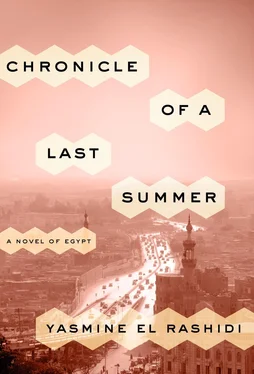The transaction of words across the table was clear. Dido burst forward. His plastic chair pushed onto its hind legs and then over onto the floor. I watched as he took fierce strides towards them. His legs were skinny, his jeans sat just below the line of his boxers. He had lost weight over the past year, his face now drawn. He had stopped wearing a tie some time ago and only ever wore plain T-shirts and colored hoodies. Even in the summer. He would tell me to meet him at El Borsa, and I could spot him by his hood, which was always over his head. We didn’t speak about all that much anymore, not the way we used to, even though we spent hours at cafés on the pedestrian streets in downtown together. His eyes still twinkled and his mouth was always verging on a smile, but he had become somewhat dispirited. One afternoon I noticed his engagement ring was off. I asked. He shrugged. It’s over. His second fiancée. She isn’t right anymore. Why? Don’t want to talk about it. I said nothing but could see he was hurt, so tried to change subject, make conversation. I brought up my book again. The main narrator, what did he think, how should I deal with form ? We were both interested in this, what a new Egyptian modernism, founded in the vernacular, might be, and some afternoons Dido would spontaneously want to talk about it, things I should read around it, an idea he had, even as he concurrently wanted me to put my writing aside and join the movement. But that afternoon he swung back onto the hind legs of his chair, pulled the cords of his hoodie, tucked his head deeper in. We sat in silence. His friends, overlapping groups of old leftists and a new, much younger generation of activists, all looked much like him. Less in their dress, but more so in their demeanor. Dido’s red hood slipped off his head as he barged toward the young men. He lowered his face between them, clenched his fists. I made out the insults. Heads had turned. The café paused. The yellow-headbanded boy put his hands up as if in surrender, or appeal. Dido flicked his hand in the air and swore. He paused over them. It might have been less than a minute that felt like time had stopped. Traitors , he said under his breath as he strode back towards me and sat with a thud. He became incensed when I expressed a sympathy, suggesting that they were only trying to find a way of making a life for themselves, that he should be more forgiving.
It wasn’t that many weeks later that Uncle had died, and at the funeral Dido ignored me. He walked into the mosque, kissed Mama, Aunty, Taunte, wiping both his and also her tears, then sauntered to the farthest row of chairs and sat down, burying his head in his phone. I couldn’t remember ever having seen him cry before. The mosque had been packed. People poured in. Uncle seemed to have known everyone. Yousra was there, the widow of Sadat was there, for a moment even the pop star Amr Diab. The farmers came from Faiyûm. The service was held in the only mosque in the city that allowed men and women to be seated in the same large hall. I imagined that Dido might not have come had we been segregated. I watched him, kept my eye on him, but hadn’t noticed when he left. Mama remarked later how withdrawn he seemed. A cousin asked why we weren’t speaking, then said she worried that his activism had become as much about intolerance of experiences that strayed from his ideals as it was the tolerance he preached. She worried he was too influenced by those around him. I imagined Uncle would have said he was hardened by life. It saddened me, the sudden change in him, our distance, but I wondered if perhaps he was also simply brokenhearted.
—
Everything seemed to happen that summer. It was the end of August. I had come up the stairs with a bag of oranges for Mama and found the door open. I peered into the living room. She was sitting on the sofa, TV on, muted. A talk show was playing. It seemed to be a program about Ahmed Zeweil. Mama had got rid of Granny’s fan some summers before, but the new plastic one seemed to have become equally noisy. It drowned out my footsteps. I walked in. Mama’s face was to the television, but I could feel her neck, her entire being, turn towards me. She spoke without moving, her eyes focused on an abstract point on the screen. I could feel the words wrestle with her throat, until eventually they came out. Drawn, slow, deliberate. I have some news, she said. She started by telling me about a dream she had the week before, in which Baba had tapped her on the shoulder. I stood, didn’t say anything, waited. She spoke.
Apparently.
Your Baba is back.
He is staying at your aunts’.
He would like to see you.
As you can imagine, he has been through a rough time.
I stared at Mama, then the TV. I stood in silence for a moment. She sat in silence for a moment. My body felt transfixed. My mind blank before it began to spin. I wanted to ask where he had come back from, how long he was staying. Had she spoken to him, had he come to the house? What kind of rough time? Mama pressed the mute button to bring back the sound. I stood there for as long as I could in my daze, staring at her steely profile, then I turned around and moved, as if automated, in the direction of the kitchen. I emptied the bag of oranges into the white plastic basin in the sink. Turned the tap on. Took the blue Bril liquid soap and squirted some into the container. I held the tap until the soap had foamed over the oranges. Turned it off. Stared at nothing in particular for a long time. I went onto the balcony and looked out at our neighbor’s building, and all the apartments I had watched for years with their shutters closed. Baba was back. Had anyone seen him? Would they know who he was? My lip trembled, and I bit on it. Hours might have passed. Baba was back. I tried to mentally conjure who an older Baba might be. Would his hair have grayed, thinned, run the span of its life course, leaving him bald? Would the years have eroded his frame, making him smaller? Would he still walk as he used to, his head held high as if pushed up at the chin by a father’s disapproving thumb, his steps slow, deliberate, his shoulders tilted back? Would he laugh in the way I remembered, throwing his whole head, his neck, his chest, back in a forceful bellow? Everyone had always remarked on Baba’s laugh, how emphatic it was. I remembered what Uncle said about memories. All my own overwritten memories were ones I wished to have back. I imagined the memory of Baba was one Uncle would have chosen to preserve. For a moment, standing on the balcony, seeking balance in Mama’s words, I wondered if it might have been what I would wish I could choose too.
—
In those first weeks I couldn’t look at Baba for long without needing to turn away. We would meet every few days and sit by the pool at the club in a near silence, watching people walk by. I hadn’t anticipated the lapse of time would hang so heavily on his face, or maybe I simply hadn’t known what to expect. Baba’s lip trembled, and I would feel him staring at me, taking me in, assessing the change, the years, who I had become. I thought Dido had probably been right, I felt an anger, but didn’t know what to do with it, what to make of it, even where it belonged. I started to get irritated by most everything Baba said. We bickered, argued. I felt resentment, both at his absence and now at his presence. Things felt fraught, and at moments I even wished he weren’t there.
—
Months later I called Baba spontaneously, exhilarated after the first day of protests, wanting to share my excitement. There was no cell reception those days, the government had shut it off, and Baba began to call early every morning on the landline, just after dawn, and then again late at night, past two a.m., when he knew I came home. Our relationship found a grounding in politics, and then towards the end of that first year, when Baba came to terms with the reality that he couldn’t slip back into the life he had left behind, he talked about finding himself a wife. He would speak to me about the cycles of history, how we were reliving a past, almost like déjà vu, then he would trail off about companionship. Baba was lonely. He was also deeply skeptical. He repeated himself, as Grandmama used to, telling me about his generation, their experience, the losses and disappointments of his youth. We have lived it all before, he said, we already tried it. He didn’t want my hopes to be too high.
Читать дальше

![Маргарет Миллар - Rose's Last Summer [= The Lively Corpse]](/books/384369/margaret-millar-rose-s-last-summer-the-lively-c-thumb.webp)










